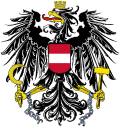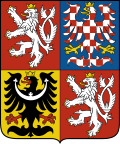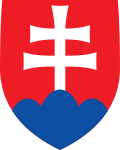| Name | Republic of Austria
Austria | | Czech Republic
Czechia | | Hungary
Hungary | | Slovak Republic
Slovakia | | Republic of Slovenia
Slovenia |
|---|
| Republik Österreich | Česká republika | Magyarország | Slovenská republika | Republika Slovenija |
|---|
| Arms |  |  |  |  |  |
|---|
| Flag |  |  |  |  |  |
|---|
| Population | 8,902,600 (2020) | 3rd | 10,693,939 (2020) | 1st | 9,772,756 (2019) | 2nd | 5,457,926 (2020) | 4th | 2,095,861 (2020) | 5th |
|---|
| Area | 83,879 km2 | 2nd | 78,866 km2 | 3rd | 93,030 km2 | 1st | 49,035 km2 | 4th | 20,271 km2 | 5th |
|---|
| Government | Federal parliamentary constitutional republic | Unitary parliamentary constitutional republic | Unitary parliamentary constitutional republic | Unitary parliamentary constitutional republic | Unitary parliamentary constitutional republic |
|---|
| Capital | Vienna | Prague | Budapest | Bratislava | Ljubljana |
|---|
| Head of state | Alexander Van der Bellen (Ind.)
President (2016–) | Petr Pavel (Ind.)
President (2023–) | Katalin Novák (Fidesz/EPP suspended)
President (2022–) | Peter Pellegrini Voice – Social Democracy
President (2024–) | Nataša Pirc Musar (Ind.)
President (2022–) |
|---|
| Head of government | Christian Stocker(ÖVP/EPP)
Federal Chancellor (2025–) | Petr Fiala (ODS/ECR)
Prime Minister (2021–) | Viktor Orbán (Fidesz/EPP suspended)
Prime Minister (2010–) | Robert Fico (SMER/unaffiliated)
Prime Minister (2023–) | Robert Golob (GS/RE)
Prime Minister (2022–) |
|---|
| Foreign minister | Beate Meinl-Reisinger (NEOS)
Minister of European and International Affairs (2025–) | Jan Lipavský (Pirates/G-EFA)
Minister of Foreign Affairs (2021–) | Péter Szijjártó (Fidesz/EPP suspended)
Minister of Foreign Affairs and Trade (2014–) | Juraj Blanár (SMER/unaffiliated)
Minister of Foreign Affairs and European Affairs (2023–) | Tanja Fajon (SD/S&D)
Minister of Foreign Affairs (2022–) |
|---|
| GDP (nominal) | $477.672 billion (2018) | 1st | $261.732 billion (2020) | 2nd | $180.498 billion (2020) | 3rd | $111.874 billion (2020) | 4th | $56 billion (2020) | 5th |
|---|
| GDP (nominal) per capita | $53,764 (2018) | 1st | $24,569 (2020) | 3rd | $18,535 (2020) | 5th | $20,495 (2020) | 4th | $27,452 (2020) | 2nd |
|---|
| GDP (PPP) | $461.432 billion (2018) | 1st | $432.346 billion (2020) | 2nd | $350.000 billion (2020) | 3rd | $209.186 billion (2020) | 4th | $83 billion (2020) | 5th |
|---|
| GDP (PPP) per capita | $51,936 (2018) | 1st | $40,585 (2020) | 2nd | $35,941 (2020) | 5th | $38,321 (2020) | 4th | $40,343 (2020) | 3rd |
|---|
| Currency | Euro (€) – EUR | Czech koruna (Kč) – CZK | Hungarian forint (Ft) – HUF | Euro (€) – EUR | Euro (€) – EUR |
|---|
| HDI | 0.914 (very high) (2018) | 1st | 0.891 (very high) (2018) | 3rd | 0.845 (very high) (2018) | 5th | 0.857 (very high) (2018) | 4th | 0.902 (very high) (2018) | 2nd |
|---|
| Gini | 27.5 (low) (2019) | 4th | 24.0 (low) (2019) | 3rd | 28.0 (low) (2019) | 5th | 20.9 (low) (2019) | 1st | 23.9 (low) (2019) | 2nd |
|---|















